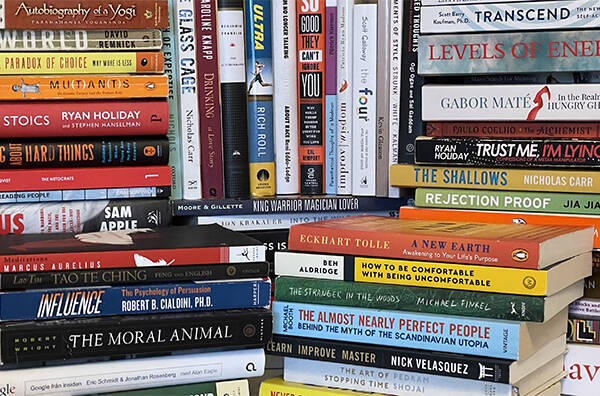At the BookLab, I sometimes turn to fiction that can enlighten us about the human condition and offer guidance on how to cope with adversity. A book that fits this category is A Man in Full, a novel by Tom Wolfe that explores themes of race, class, power, and the American Dream in the context of Atlanta, Georgia. In this post, we’ll focus on how the philosophy of Stoicism transforms the lives of two of the book’s main characters, Conrad Hensley and Charlie Croker.
Who are Conrad and Charlie?
Charlie Croker is a wealthy, 60-year-old real estate magnate and a prominent member of Atlanta’s high society. However, he faces significant financial and personal challenges that threaten to derail his life.
Conrad Hensley, on the other hand, is an idealistic young worker at a frozen goods warehouse owned by one of Charlie’s subsidiaries. He is laid off due to downsizing efforts that Charlie initiates to save his business from bankruptcy.
Stoicism for Conrad Hensley
Conrad’s transformation begins with a Kafkaesque and farcical parking incident that lands him in jail after he refuses to accept a plea bargain. While in prison, he requests a copy of a spy thriller titled The Stoics’ Game but instead receives a book of Stoic philosophy featuring writings from Epictetus and other Stoic philosophers.
As Conrad delves into the book, he discovers that Epictetus was a philosopher who endured great hardship, including imprisonment and torture, but emerged as one of the greatest thinkers of Imperial Rome. Conrad learns that our bodies and possessions are mere trifles.
He also learns that adversity and difficulty present opportunities to test and strengthen our resolve and will, and that we can endure any hardships as long as we maintain our dignity, self-respect, and what we see as our character. Conrad’s exposure to Stoicism transforms him into a stoic and gives him a new outlook on life.
Stoicism for Charlie Croker
Charlie’s realization about the power of Stoicism occurs during a different type of crisis. After losing much of his fortune and facing numerous legal and personal challenges, Charlie initially reacts with anger and frustration. However, he eventually comes to understand that these setbacks are an opportunity to reassess his priorities and his approach to life.
Charlie turns to the writings of the Stoics, particularly Marcus Aurelius, and begins to see that his struggles are part of a larger pattern of human experience. He learns to accept his circumstances and to find peace and meaning in the present moment, rather than constantly striving for external success and validation.
Both Conrad and Charlie’s realizations about the power of Stoicism are pivotal moments in their character arcs, as they begin to shift their perspectives and find new sources of strength and resilience.
Video: The Stoicism of A Man in Full
Books that will teach you more about Stoicism
Overall, A Man in Full offers a compelling exploration of the challenges and rewards of adopting a Stoic outlook on life, and shows how this philosophy can transform even the most unlikely individuals. If you’re interested in learning more about Stoic philosophy, I recommend the following book:
A Guide to the Good Life by William B. Irvine (Review)- This book is an excellent introduction to Stoicism, providing practical advice for applying its principles to modern life. It covers key Stoic concepts such as negative visualization, premeditation of future evils, and self-denial.
On the Shortness of Life by Seneca – This short but powerful book examines the fleeting nature of life and the importance of making the most of our time. It encourages readers to live in the present moment and avoid distractions that detract from our ability to live a fulfilling life.
Courage Under Fire: Testing Epictetus’s Doctrines in a Laboratory of Human Behavior (Review) – This is the primary book by James Stockdale, a former prisoner of war who endured seven years of captivity during the Vietnam War. In this book, Stockdale discusses how he used the principles of Stoicism to cope with the intense physical and emotional suffering of his captivity.
Enchiridion by Epictetus – This concise handbook is a great starting point for those new to Stoicism. It covers a range of topics, from the importance of living a virtuous life to the role of reason in decision-making.
Meditations by Marcus Aurelius – This classic work is a personal journal of the Roman emperor’s thoughts and reflections on Stoic philosophy. It provides valuable insights into Stoic ethics, including the importance of self-discipline, personal responsibility, and living in harmony with nature.
Stoicism and the Art of Happiness by Donald Robertson (Review)- This book explores how the principles of Stoicism can help us to cultivate greater happiness and resilience in the face of adversity. It provides practical exercises and techniques for applying Stoic philosophy to everyday life.
Letters from a Stoic by Seneca (Review) – This collection of letters offers a fascinating insight into the life and philosophy of one of Stoicism’s most famous practitioners. Seneca provides advice on everything from dealing with grief and anger to the importance of self-improvement and living a virtuous life.
Overall, these Stoic books provide valuable insights into a philosophy that emphasizes self-discipline, personal responsibility, and the pursuit of a virtuous life. They offer practical advice for navigating life’s challenges and developing greater resilience, happiness, and inner peace.
Find more great book to read on my book reviews page and the Great Books List
Video Reviews every week on YouTube and support the BookLab mission on Patreon




